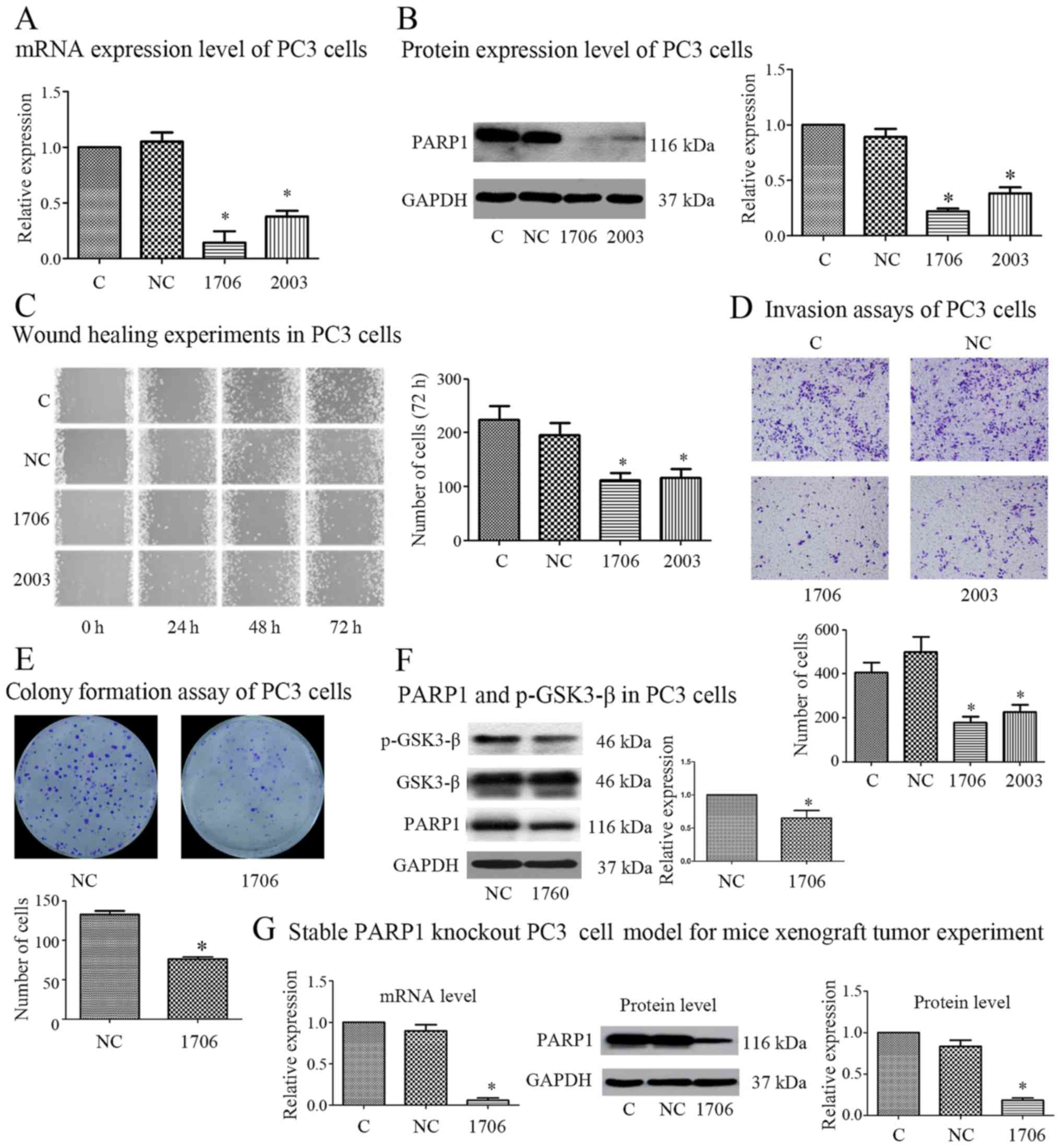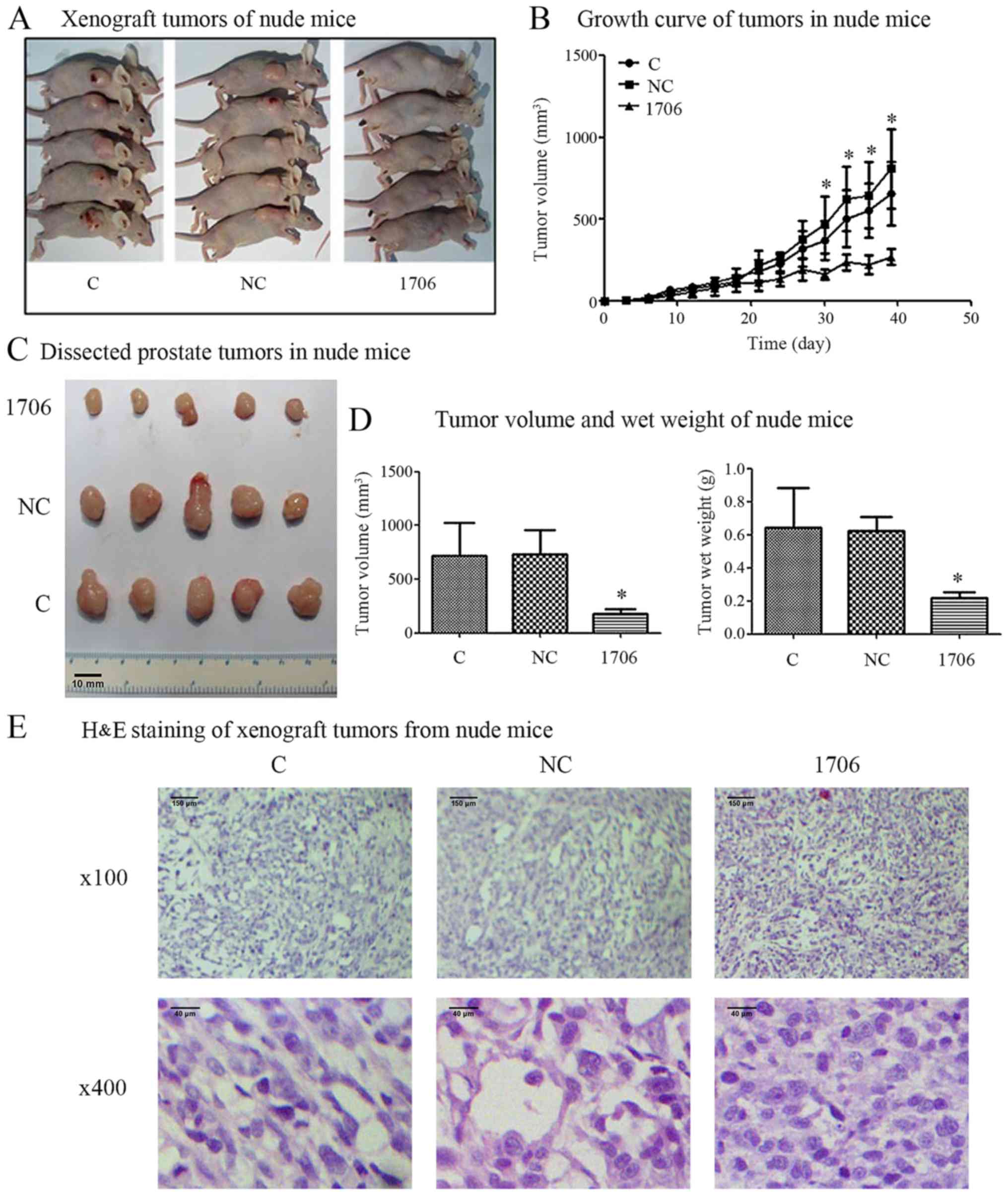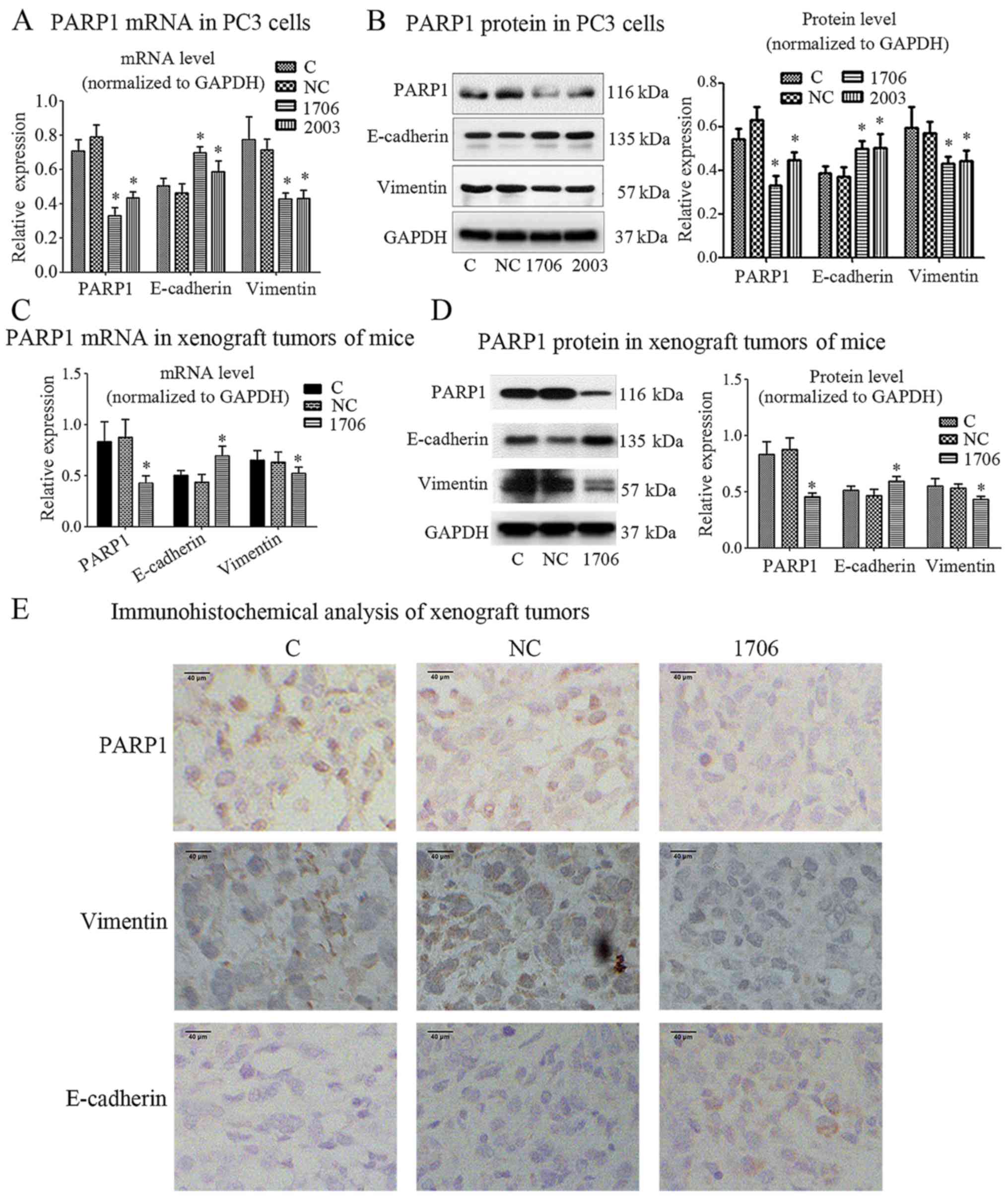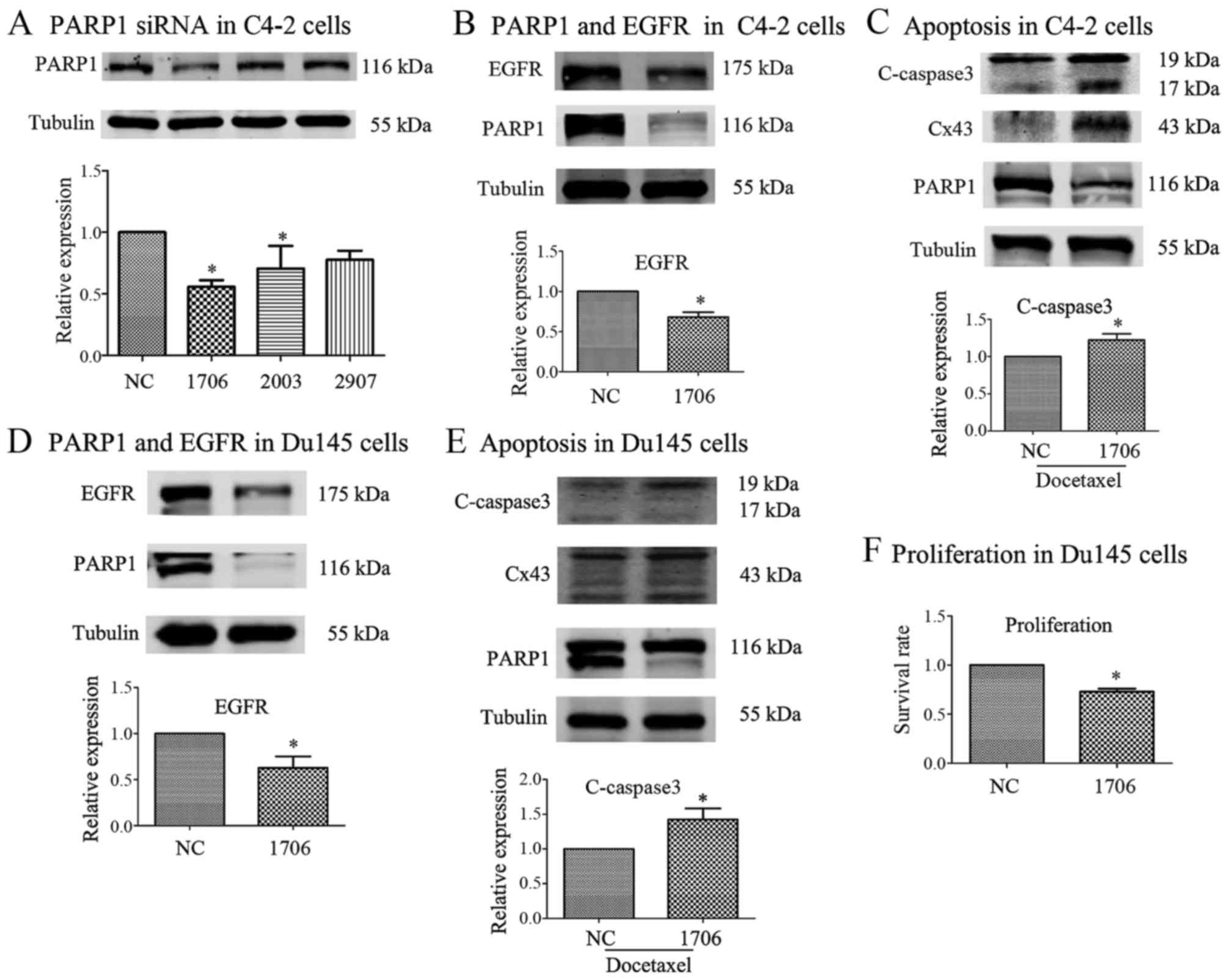|
1
|
Siegel RL, Miller KD and Jemal A: Cancer
Statistics, 2017. CA Cancer J Clin. 67:7–30. 2017. View Article : Google Scholar : PubMed/NCBI
|
|
2
|
Blessing AM, Rajapakshe K, Reddy Bollu L,
Shi Y, White MA, Pham AH, Lin C, Jonsson P, Cortes CJ, Cheung E, et
al: Transcriptional regulation of core autophagy and lysosomal
genes by the androgen receptor promotes prostate cancer
progression. Autophagy. 13:506–521. 2017. View Article : Google Scholar : PubMed/NCBI
|
|
3
|
Lu X, Horner JW, Paul E, Shang X, Troncoso
P, Deng P, Jiang S, Chang Q, Spring DJ, Sharma P, et al: Erratum:
Effective combinatorial immunotherapy for castration-resistant
prostate cancer. Nature. 543:1162017. View Article : Google Scholar
|
|
4
|
Lin KY and Kraus WL: PARP Inhibitors for
cancer therapy. Cell. 169:1832017. View Article : Google Scholar : PubMed/NCBI
|
|
5
|
Ray Chaudhuri A and Nussenzweig A: The
multifaceted roles of PARP1 in DNA repair and chromatin
remodelling. Nat Rev Mol Cell Biol. 18:610–621. 2017. View Article : Google Scholar : PubMed/NCBI
|
|
6
|
Schiewer MJ and Knudsen KE:
Transcriptional roles of PARP1 in cancer. Mol Cancer Res.
12:1069–1080. 2014. View Article : Google Scholar : PubMed/NCBI
|
|
7
|
Asim M, Tarish F, Zecchini HI, Sanjiv K,
Gelali E, Massie CE, Baridi A, Warren AY, Zhao W, Ogris C, et al:
Synthetic lethality between androgen receptor signalling and the
PARP pathway in prostate cancer. Nat Commun. 8:3742017. View Article : Google Scholar : PubMed/NCBI
|
|
8
|
Ning J, Wakimoto H, Peters C, Martuza RL
and Rabkin SD: Rad51 degradation: Role in oncolytic
virus-poly(ADP-ribose) polymerase inhibitor combination therapy in
glioblastoma. J Natl Cancer Inst. 109:1–13. 2017. View Article : Google Scholar : PubMed/NCBI
|
|
9
|
Wu W, Zhu H, Liang Y, Kong Z, Duan X, Li
S, Zhao Z, Yang D and Zeng G: Expression of PARP-1 and its active
polymer PAR in prostate cancer and benign prostatic hyperplasia in
Chinese patients. Int Urol Nephrol. 46:1345–1349. 2014. View Article : Google Scholar : PubMed/NCBI
|
|
10
|
Wu W, Kong Z, Duan X, Zhu H, Li S, Zeng S,
Liang Y, Iliakis G, Gui Z and Yang D: Inhibition of PARP1 by small
interfering RNA enhances docetaxel activity against human prostate
cancer PC3 cells. Biochem Biophys Res Commun. 442:127–132. 2013.
View Article : Google Scholar : PubMed/NCBI
|
|
11
|
Lee JY and Kong G: Roles and epigenetic
regulation of epithelial-mesenchymal transition and its
transcription factors in cancer initiation and progression. Cell
Mol Life Sci. 73:4643–4660. 2016. View Article : Google Scholar : PubMed/NCBI
|
|
12
|
Rojo F, Garcia-Parra J, Zazo S, Tusquets
I, Ferrer-Lozano J, Menendez S, Eroles P, Chamizo C, Servitja S,
Ramírez-Merino N, et al: Nuclear PARP-1 protein overexpression is
associated with poor overall survival in early breast cancer. Ann
Oncol. 23:1156–1164. 2012. View Article : Google Scholar : PubMed/NCBI
|
|
13
|
Donizy P, Pietrzyk G, Halon A, Kozyra C,
Gansukh T, Lage H, Surowiak P and Matkowski R: Nuclear-cytoplasmic
PARP-1 expression as an unfavorable prognostic marker in lymph
node-negative early breast cancer: 15-year follow-up. Oncol Rep.
31:1777–1787. 2014. View Article : Google Scholar : PubMed/NCBI
|
|
14
|
Liu Y, Zhang Y, Zhao Y, Gao D, Xing J and
Liu H: High PARP-1 expression is associated with tumor invasion and
poor prognosis in gastric cancer. Oncol Lett. 12:3825–3835. 2016.
View Article : Google Scholar : PubMed/NCBI
|
|
15
|
Galia A, Calogero AE, Condorelli R,
Fraggetta F, La Corte A, Ridolfo F, Bosco P, Castiglione R and
Salemi M: PARP-1 protein expression in glioblastoma multiforme. Eur
J Histochem. 56:e92012. View Article : Google Scholar : PubMed/NCBI
|
|
16
|
Kurfurstova D, Bartkova J, Vrtel R,
Mickova A, Burdova A, Majera D, Mistrik M, Kral M, Santer FR,
Bouchal J and Bartek J: DNA damage signalling barrier, oxidative
stress and treatment-relevant DNA repair factor alterations during
progression of human prostate cancer. Mol Oncol. 10:879–894. 2016.
View Article : Google Scholar : PubMed/NCBI
|
|
17
|
Choi YE, Meghani K, Brault ME, Leclerc L,
He YJ, Day TA, Elias KM, Drapkin R, Weinstock DM, Dao F, et al:
Platinum and PARP inhibitor resistance due to overexpression of
MicroRNA-622 in BRCA1-Mutant ovarian cancer. Cell Rep. 14:429–439.
2016. View Article : Google Scholar : PubMed/NCBI
|
|
18
|
Wang Y, Krais JJ, Bernhardy AJ, Nicolas E,
Cai KQ, Harrell MI, Kim HH, George E, Swisher EM, Simpkins F and
Johnson N: RING domain-deficient BRCA1 promotes PARP inhibitor and
platinum resistance. J Clin Invest. 126:3145–3157. 2016. View Article : Google Scholar : PubMed/NCBI
|
|
19
|
Tong D, Liu Q, Liu G, Xu J, Lan W, Jiang
Y, Xiao H, Zhang D and Jiang J: Metformin inhibits
castration-induced EMT in prostate cancer by repressing
COX2/PGE2/STAT3 axis. Cancer Lett. 389:23–32. 2017. View Article : Google Scholar : PubMed/NCBI
|
|
20
|
Chaudhry P, Fabi F, Singh M, Parent S,
Leblanc V and Asselin E: Prostate apoptosis response-4 mediates
TGF-β-induced epithelial-to-mesenchymal transition. Cell Death Dis.
5:e10442014. View Article : Google Scholar : PubMed/NCBI
|
|
21
|
Pu H, Horbinski C, Hensley PJ, Matuszak
EA, Atkinson T and Kyprianou N: PARP-1 regulates
epithelial-mesenchymal transition (EMT) in prostate tumorigenesis.
Carcinogenesis. 35:2592–2601. 2014. View Article : Google Scholar : PubMed/NCBI
|
|
22
|
Day KC, Lorenzatti Hiles GL, Kozminsky M,
Dawsey SJ, Paul A, Broses LJ, Shah R, Kunja LP, Hall C, Palanisamy
N, et al: HER2 and EGFR overexpression support metastatic
progression of prostate cancer to bone. Cancer Res. 77:74–85. 2017.
View Article : Google Scholar : PubMed/NCBI
|
|
23
|
Liu XL, Zhang XT, Meng J, Zhang HF, Zhao
Y, Li C, Sun Y, Mei QB, Zhang F and Zhang T: ING5 knockdown
enhances migration and invasion of lung cancer cells by inducing
EMT via EGFR/PI3K/Akt and IL-6/STAT3 signaling pathways.
Oncotarget. 8:54265–54276. 2017.PubMed/NCBI
|
|
24
|
El Bezawy R, Cominetti D, Fenderico N,
Zuco V, Beretta GL, Dugo M, Arrighetti N, Stucchi C, Rancati T,
Valdagni R, et al: miR-875-5p counteracts epithelial-to-mesenchymal
transition and enhances radiation response in prostate cancer
through repression of the EGFR-ZEB1 axis. Cancer Lett. 395:53–62.
2017. View Article : Google Scholar : PubMed/NCBI
|
|
25
|
Kim GT, Lee SH and Kim YM: Torilis
japonica extract, a new potential EMT suppressor agent by
regulation of EGFR signaling pathways. Int J Oncol. 45:1673–1679.
2014. View Article : Google Scholar : PubMed/NCBI
|
|
26
|
Wei A, Fan B, Zhao Y, Zhang H, Wang L, Yu
X, Yuan Q, Yang D and Wang S: ST6Gal-I overexpression facilitates
prostate cancer progression via the PI3K/Akt/GSK-3β/β-catenin
signaling pathway. Oncotarget. 7:65374–65388. 2016. View Article : Google Scholar : PubMed/NCBI
|
|
27
|
Guo H, Luo H, Yuan H, Xia Y, Shu P, Huang
X, Lu Y, Liu X, Keller ET, Sun D, et al: Litchi seed extracts
diminish prostate cancer progression via induction of apoptosis and
attenuation of EMT through Akt/GSK-3β signaling. Sci Rep.
7:416562017. View Article : Google Scholar : PubMed/NCBI
|
|
28
|
Jiao S, Xia W, Yamaguchi H, Wei Y, Chen
MK, Hsu JM, Hsu JL, Yu WH, Du Y, Lee HH, et al: PARP inhibitor
upregulates PD-L1 expression and enhances cancer-associated
immunosuppression. Clin Cancer Res. 23:3711–3720. 2017. View Article : Google Scholar : PubMed/NCBI
|
|
29
|
Wang J, Kho DH, Zhou JY, Davis RJ and Wu
GS: MKP-1 suppresses PARP-1 degradation to mediate cisplatin
resistance. Oncogene. 36:5939–5947. 2017. View Article : Google Scholar : PubMed/NCBI
|
|
30
|
Schiewer MJ, Goodwin JF, Han S, Brenner
JC, Augello MA, Dean JL, Liu F, Planck JL, Ravindranathan P,
Chinnaiyan AM, et al: Dual roles of PARP-1 promote cancer growth
and progression. Cancer Discov. 2:1134–1149. 2012. View Article : Google Scholar : PubMed/NCBI
|


















